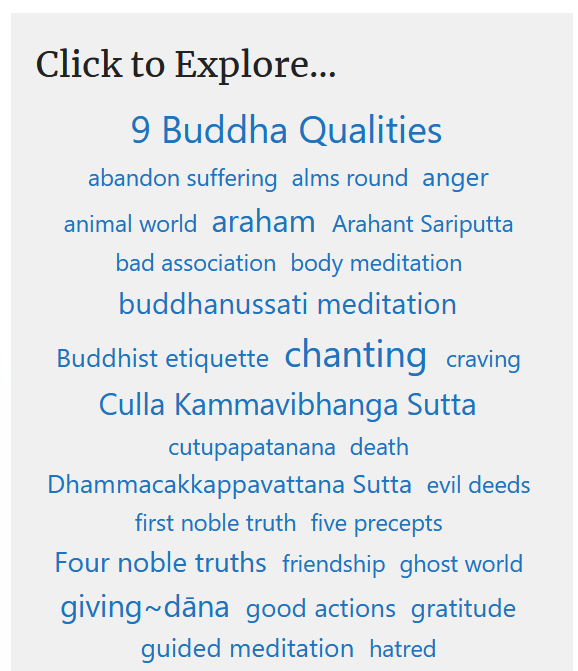What do you need to know?
Tagging Guidelines
Purpose of Tags
- To connect similar content
- To create an index of topics
Where do we see tags?
The main place users will see the tags are in the tag cloud and at the bottom of posts:

At the bottom of posts 
In the tag cloud 
At the bottom of pages without sidebars
Before you create a new tag, ask…
- Is there at least one other post I can give this tag to? (it’s not too specific)
- Will there be more than 20 posts that could be tagged with this? (it’s not too general, like “Dhamma”)
- Is this tag an important topic in this page? Would someone clicking on this tag be satisfied to find this page?
General Guidelines
- See the SuttaFriends.org topic page for good tag examples
- Tags should not be too specific or too general.
- Only capitalize proper nouns. (names of people, places, suttas)
- Use English instead of Pali
- Use Pali instead of Sinhala/Sanskrit (Except Karma)
- On special words we can use English and Pali (giving~dāna, virtue~sīla, etc). Ask Bhantes before creating a new English~Pali word.
- Two words or less
- Names as tags (only for very popular people) should start with the name first. Eg: Sāriputta Arahant, not
Venerable SāriputtaSee the way they are done on SuttaFriends.org.
Sutta Names as tags?
Do not make tags out of sutta names. It is true that we have a few sutta names as tags, but these are only for the most popular suttas that we will have several posts about. If you see three or more posts that could be tagged with the name of the sutta, then please ask the bhantes if you should create a tag for them. Otherwise, don’t make tags out of sutta names.
Don’t Tag
- If a Dhamma programme (podcast or video) includes a guided meditation or paritta chanting do not tag it with that tag. Why? It’s just not important enough overall in that content.
Examples of BAD tags
Dhamma— Too general. Everything could be tagged as Dhamma
Rebirth as Ghosts—Too specific. Use. ghost world instead
Collecting Merits—Too specific. Use merit instead
What Happens After Death—This is the name of a series
CDF World News #1—This is the name of an episode